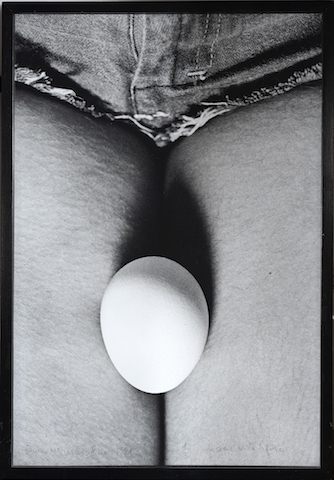Eggs are plentiful in Anna Maria Maiolino’s first UK retrospective. They are rolled across a table by two men in latex gloves for the film + – = – (Mais Menos Igual Menos) (1976), a discomfiting activity somewhere between a medical examination and a sport. They cover a pavement on which a blindfolded woman walks for the performance Entrevidas (Between Lives, 1981). They are photographed at the tops of stairwells, on the seats of chairs and resting between thighs.
Imperiled but never broken, Maiolino’s egg reads variously as a symbol of the fragility of life under an oppressive regime, motherhood, female reproduction and the claims made upon it by men. Born in Italy in 1942, Maiolino moved with her family to Venezuela when she was twelve years old, and then on to Brazil. Entrevidas was performed in Rio de Janeiro in the final years of the military dictatorship (the first free elections for the national legislature since the 1964 coup were held in 1982). Documentary photographs of the event read like a pictographic formula for the tense political atmosphere: eggs + pavement + legs = treading on eggshells.
Not everything on show is as amenable to translation. This survey covers five decades of an often sibylline and introverted practice. In the downstairs gallery, painted shapes displayed in frames fill a wall like rudimentary hieroglyphs. Elsewhere, experiments with paper turn into private diagrams and drawings spiral into asemic writing. As I wander the rooms I feel like I’m looking at a draft alphabet for a language I cannot decode. At times this results in a kind of affective muteness, enhanced by Maiolino’s inexpressive style, which gives little away. Yet the muteness has its politics. In the central image of the photographic triptych É o que sobra (What Is Left Over, 1974), the artist holds a pair of scissors around her tongue. During the Brazilian dictatorship, critics of the regime were routinely murdered. Speak, the photograph seems to say, and you may be brutally silenced. The sentiment resonates today: President Jair Bolsonaro, elected in 2018 following a racist, misogynist and homophobic campaign, has openly praised the former dictatorship’s use of torture.
Despite the invocation of love in the exhibition’s title, and its promise of revolution, I find the emotional register forlorn, the atmosphere one of entrapment. At the entrance to the gallery is the site-specific installation Until Now (2019), one of a number of works in clay Maiolino has been making since the 1990s. Long strands of rolled, unfired terracotta are piled up like rusty chains. Their blankness, and their multiplication, call to mind a particularly abject sort of drudgery. One work in particular suggests a desire to flee. In the etching Escape Angle (1971), a black outline of a square is missing its bottom right corner. In this art of hidden meanings, a simple square could represent many things: a house, a country, a body, a prison, a shell. Through the gap, an almost-invisible shape oozes out, white on white.
Anna Maria Maiolino: Making Love Revolutionary, Whitechapel Gallery, London, 25 September 2019 – 12 January 2020
From the December 2019 issue of ArtReview
